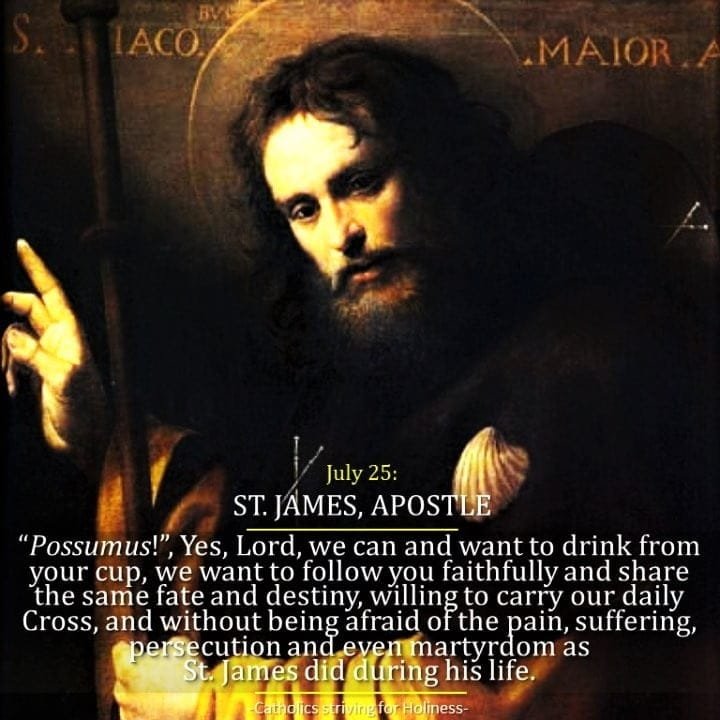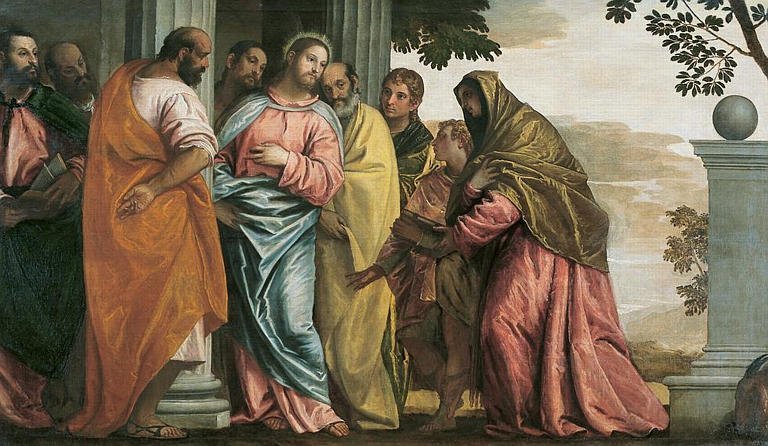JULY 25: ST. JAMES GOSPEL AND COMMENTARY: :
“THE SON OF MAN DID NOT COME TO BE SERVED BUT TO SERVE”
(Mt 20:20–28).

Mt 20:20–28
The mother of the sons of Zebedee approached Jesus with her sons and did him homage, wishing to ask him for something. He said to her, “What do you wish?” She answered him, “Command that these two sons of mine sit, one at your right and the other at your left, in your Kingdom.” Jesus said in reply, “You do not know what you are asking. Can you drink the chalice that I am going to drink?” They said to him, “We can.” He replied, “My chalice you will indeed drink, but to sit at my right and at my left, this is not mine to give but is for those for whom it has been prepared by my Father.” When the ten heard this, they became indignant at the two brothers. But Jesus summoned them and said, “You know that the rulers of the Gentiles lord it over them, and the great ones make their authority over them felt. But it shall not be so among you. Rather, whoever wishes to be great among you shall be your servant; whoever wishes to be first among you shall be your slave. Just so, the Son of Man did not come to be served but to serve and to give his life as a ransom for many.”
Gospel Commentary from the Navarre Bible, Commentary to the Gospel of St. Matthew (with permission).
- 20 “Command that these two sons of mine sit, one at your right and the other at your left, in your Kingdom.”
- The sons of Zebedee are James the Greater and John. Their mother, Salome, thinking that the earthly reign of the Messiah is about to be established, asks that her sons be given the two foremost positions in it.
- Christ reproaches them for not grasping the true — spiritual — nature of the Kingdom of heaven and not realizing that government of the Church he is going to found implies service and martyrdom.
- “If you are working for Christ and imagine that a position of responsibility is anything but a burden, what disillusionment awaits you!” (J. Escrivá, The Way, 950).
- The sons of Zebedee are James the Greater and John. Their mother, Salome, thinking that the earthly reign of the Messiah is about to be established, asks that her sons be given the two foremost positions in it.
- 22 “Drinking the cup” means suffering persecution and martyrdom for following Christ.
- “We are able”: the sons of Zebedee boldly reply that they can drink the cup; their generous expression evokes what St Paul will write years later: “I can do all things in him who strengthens me” (Phil 4:13).
- 23 “You will drink my cup”:
- James the Greater will die a martyr’s death in Jerusalem around the year 44 (cf. Acts 12:2); and John, after suffering imprisonment and the lash in Jerusalem (cf. Acts 4:3; 5:40-41), will spend a long period of exile on the island of Patmos (cf. Rev 1:9).
- From what our Lord says here we can take it that positions of authority in the Church should not be the goal of ambition or the subject of human intrigue, but the outcome of a divine calling. Intent on doing the will of his heavenly Father, Christ was not going to allocate positions of authority on the basis of human considerations but, rather, in line with God’s plans.
- 26 Vatican II puts a marked emphasis on this service which the Church offers to the world and which Christians should show as proof of their Christian identity:
- “In proclaiming the noble destiny of man and affirming an element of the divine in him, this sacred Synod offers to co-operate unreservedly with mankind in fostering a sense of brotherhood to correspond to this destiny of theirs. The Church is not motivated by an earthly ambition but is interested in one thing only — to carry on the work of Christ under the guidance of the Holy Spirit, for he came into the world to bear witness to the truth, to save and not to judge, to serve and not to be served” (Gaudium et spes, 3; cf. Lumen gentium, 32; Ad gentes, 12; Unitatis redintegratio, 7).
- 27-28 Rather, whoever wishes to be great among you shall be your servant; whoever wishes to be first among you shall be your slave. Just so, the Son of Man did not come to be served but to serve and to give his life as a ransom for many.”
- Jesus sets himself as an example to be imitated by those who hold authority in the Church.
- He who is God and Judge of all men (cf. Phil 2:5-11; Jn 5:22-27; Acts 10:42; Mt 28:18) does not impose himself on us: he renders us loving service; to the point of giving his life for us (cf. Jn 15:13): that is his way of being the first.
- St Peter understood him right; he later exhorted priests to tend the flock of God entrusted to them, not domineering over them but being exemplary in their behaviour (cf. I Pet 5:1-3); and St Paul also was clear on this service: though he was “free from all men”, he became the servant of all in order to win all (cf. 1 Cor 9:19ff; 2 Cor 4:5).
- Christ’s “service” of mankind aims at salvation. The phrase “to give his life as a ransom for many” is in line with the terminology of liturgical sacrificial language. These words were used prophetically in chapter 53 of Isaiah.
- Jesus sets himself as an example to be imitated by those who hold authority in the Church.
- V. 28 also underlines the fact that Christ is a priest, who offers himself as priest and victim on the altar of the Cross.
- The expression “as a ransom for many” should not be interpreted as implying that God does not will the salvation of all men. “Many,” here, is used in contrast with “one” rather than “all”: there is only one Saviour, and salvation is offered to all.
VIDEO COMMENTARY ON JULY 25 GOSPEL, FEAST OF ST. JAMES THE GREATER
TOPIC: What is your motivation in helping others and in serving God?
There is a church in Palestine where the door is so low that one must stoop to enter. This was to prevent medieval raiders from riding their horses into the church to disrupt the service. The door is called, “The Humility Gate.”
The way into God’s presence is often through the Humility Gate.
Despite being with Jesus for several years, the mindset of the apostles was very much the same mindset we have today – we seek to gain favors, power and fame by being close to the powerful and the influential.
The mother of the two disciples wanted to gain favors from Jesus. The ten other disciples were no less imperfect. They were all angry and incensed with the backdoor tactics of James and John.
But Jesus’ way is different. To be great is to serve others without desiring for or expecting recognition, appreciation, fame and power. He came to serve and not be served. Jesus points out to us that greatness is manifested by a humble and generous heart, willing to serve, even at the cost of one’s time, talent and treasure.
True service is not occupying the most visible position in any organization to gain the applause of others, but working quietly, dedicatedly and with much enthusiasm, knowing that the real reward is the kingdom of God;
At 5:50am one morning, Jim Belasco arrived at Houston’s Methodist Hospital to interview renowned heart surgeon Dr. Michael DeBakey before his first operation of the day. Walking down the hall, he met a hospital worker mopping the corridor to the operating room. The worker was singing, and so Belasco asked the reason for his happiness. “Me and the Doc are saving lives” was the astounding response. His mop helped prepare the clean environment in which the great surgeon would wield his scalpel.
It is when in serving others we experience humiliation and abuse even as we have sacrificed much;
It is when we do not just listen to our own voice but to that of others, people who are considered “less than us.”
Several years ago, a Greensboro, North Carolina, newspaper carried a story about a tractor-trailer rolling along on a side street in a southern city. The driver came to a low bridge and misjudged the height of his rig. When the truck came to a stop, it was wedged tightly between the bridge and the street. Wreckers were called to remove the truck, but with all of their skills and equipment they could not budge it. Among the bystanders was a young student. The lad walked over to the men and suggested that the tires on the truck be deflated. As the air screamed from the tires, the great truck began to settle slowly away from the bridge. A wrecker was chained to the truck, and it was gently pulled backward. When the truck was free of the bridge, the tires were reinflated and the trucker was again on his way.
Let us pray the grace to have a pure heart of service and humility to enable us to love others without counting the cost, only desiring the applause from heaven.
Let’s reflect on why we serve God the way we do as we listen to this music video.
Stay updated: subscribe by email for free TO OUR NEW WEBSITE catholicsstrivingforholiness.org (PUT YOUR EMAIL IN THE SUBSCRIBE WIDGET).
If you need some resources regarding a particular topic, feel free to use the search WIDGET which has access to thousands of posts, categories and tags on Catholic spirituality.
Cordially inviting you as well to follow www.fb.com/Catholicsstrivingforholiness. and share our posts to help more people in their Christian faith and life.
Thanks and God bless you and your loved ones! Fr. Rolly Arjonillo.

